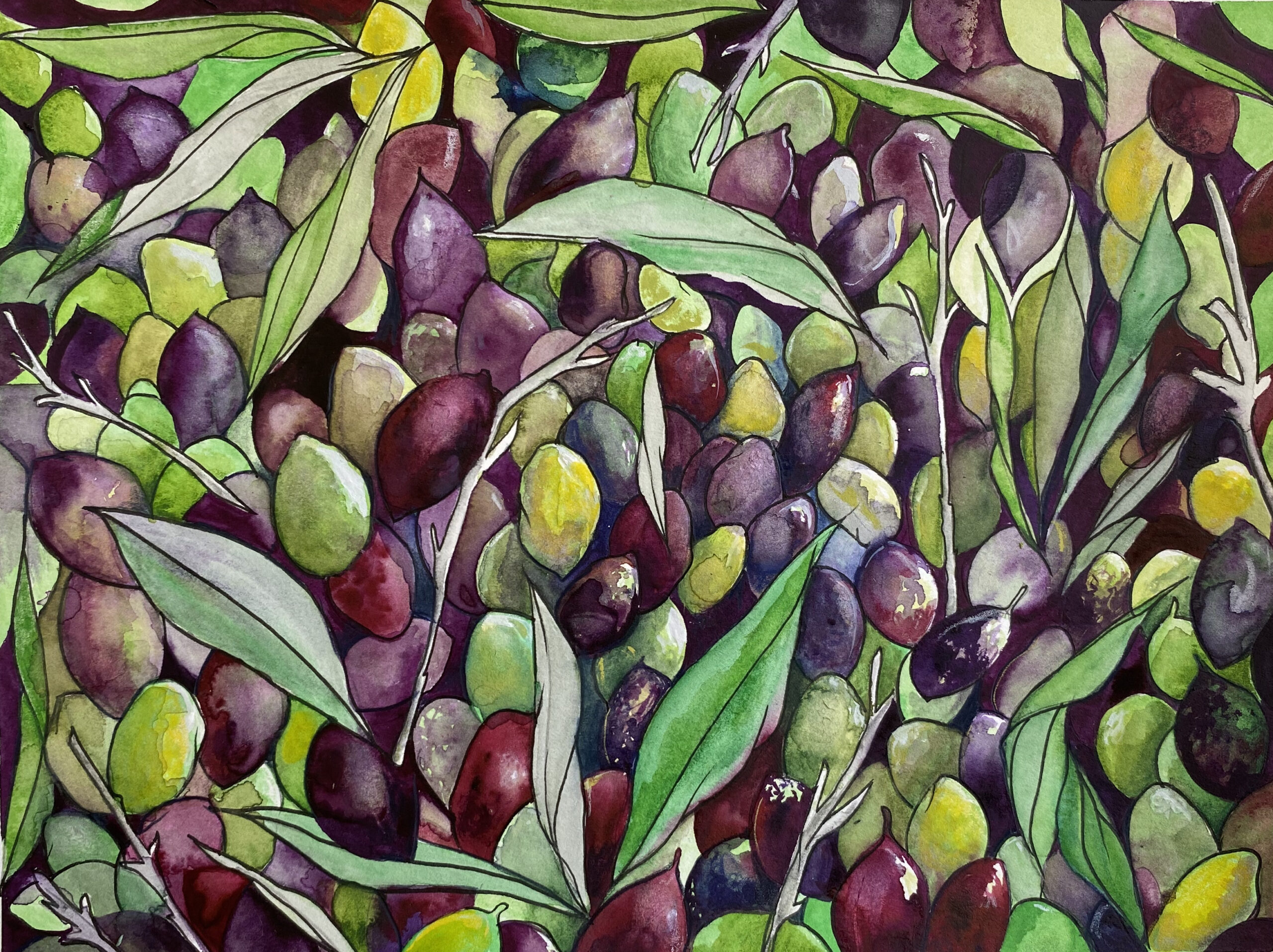After an unexpected phone call and a one-way ticket back to my family’s Croatian seaside town of Kaštela, I found myself at a local beach bar unsure how to order a coffee, preoccupied with my father’s looming death.
Seven ancient towns form the municipalities of Kaštela, with white-stone homes and red-tile rooftops stretching for miles across a changing oceanfront peninsula. There were many cafés to choose from, but I’d selected one named Gabine, a seven-minute walk from my parents’ home. It was early, and I’d found a seat with town, valley, and ocean views.
I looked up at the vast expanse of sun-baked hillside above a tranquil sea. Here, it was easy to make out the three-foot stone walls—makeshift fences hundreds of years old—sheltering olive groves across steep rolling hills and shifting family lines.
Dad owned plots of land like this. One hundred olive trees harvested each fall to make extra-virgin olive oil: an earth-gifted centuries-old tradition loved by most Croatians.
The first time I helped Dad make anything Croatian was in his garage in Calgary. I was 10. I remember dragging my feet, saying there was perfectly good wine in the stores. That making homemade wine was too much work. And I remember his stern reaction. His blue eyes like mirrors. Dad saying, “Learn something I teach you. Find what it is you need to do.”
The ancient Greeks introduced olive cultivation here thousands of years ago, with the Romans transforming it into a precious commodity used for cooking, cleaning, cosmetics, and religious rites. But for my parents, growing up in their penurious village of Communist Yugoslavia in the 1950s, olive oil wasn’t just a commodity—it was a way of life.
From my seat, I imagined being there, in their remote hillside settlement. A narrow street leads to a small stone home with no electricity and no running water—where Dad once lived. It’s early, and his brothers and older sister are huddled in shared beds, asleep.
At 6 a.m. Dad awakes, eyes half-open. He dresses in a thick maroon sweater, covers his younger brother with blankets, and lights a kerosene lamp. In the kitchen, his mother warms homemade bread on the cast-iron stove. Outside, his sister has pulled well-water. Dad joins her, cleaning his face using soap made from lard, lye, and the family’s olive oil.
Dad sets off with a large piece of toast soaked in homemade red wine and olive oil, following his sister down a dirt road toward their fields, savouring each bite, knowing this will be his only meal until dinner. He spends the day learning to collect hundreds of kilograms of olives with his family. During this harvest, he and his siblings will miss a week’s worth of school. At the age of 10, this is Dad’s first harvest.
I picture myself there as a child. Arms outstretched as I run toward the olive trees, past congregations of wild lavender, sage, and asparagus. I glide between the rows until he lifts me. Dad is middle-aged now, and he shows me the skin of an olive shifting from white-green to midnight-purple. He explains the contradictions. How this bittersweet olive can be loved so much and understood so little, like fathers who were present but mostly absent because of their own twisting, turbulent roots.
But none of this memory is real. My parents escaped Communist Yugoslavia in the late 1960s, leaving decades of olive harvests behind. Dad defected first, spending months in a French refugee camp. Mom escaped to a German chocolate factory. A chance encounter brought them to Canada, where my sister and I were born and raised.
Growing up, I never did learn to make my father’s wine. I failed at learning most things Croatian. Dad was an impatient teacher. Distant at home. Always at work. I rebelled, speaking English at home instead of Croatian. I ignored his lessons, becoming an IT consultant, writer, and podcaster once I moved to Vancouver.
But in 2012, my parents restarted the harvest to make homemade olive oil again during their annual visit home to Kaštela. At dinner parties, my wife and I loved to demonstrate how this Croatian olive oil with an aroma like ripened cherry tomatoes was one of a kind. How this luxurious emerald liquid gold was artisanal, unadulterated, like a vintage fine wine.
I revelled in the praise when guests said this was the best olive oil they’d ever tasted. But sometimes they’d say, “How incredible it must feel to be part of such traditions.” In these moments, I hid my terrible secret. Because despite my love for this oil—my regular trips back—I had never helped with a single harvest. Never in all my years. Not once.
Not until last fall. In October, I returned to pay tribute to the parts of my father I always loved. To reconcile with the parts I will never understand. With the help of my wife, I joined in the harvest, collecting 750 kilograms of olives with Dad, who now lives in Kaštela with Mom year round. I relished the process. The hard work. The contradictions.
Because the year before, as I sat in that café, my father had survived a massive heart attack and eight-hour open-heart surgery. He was 80. It was a miracle he was still alive. The waiter appeared. I ordered coffee in half-broken Croatian, feeling grateful such life-nourishing riches could be derived—formed—from such a bitter fruit.
Read more from our Spring 2025 issue.









